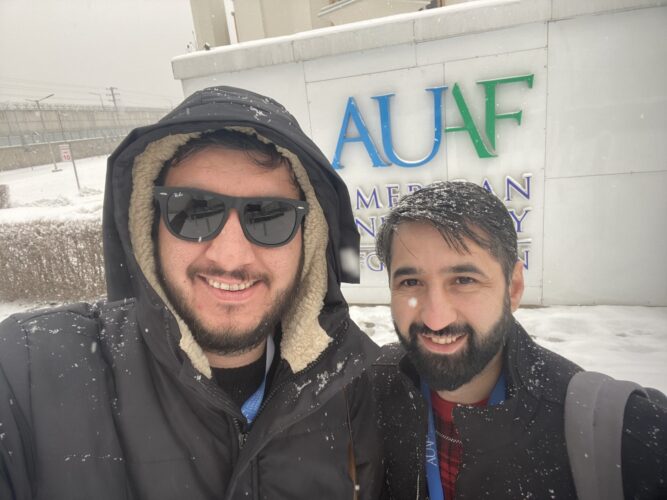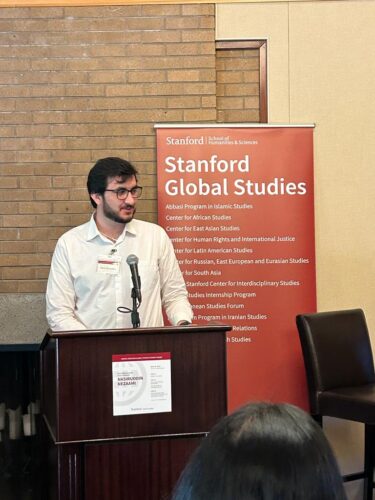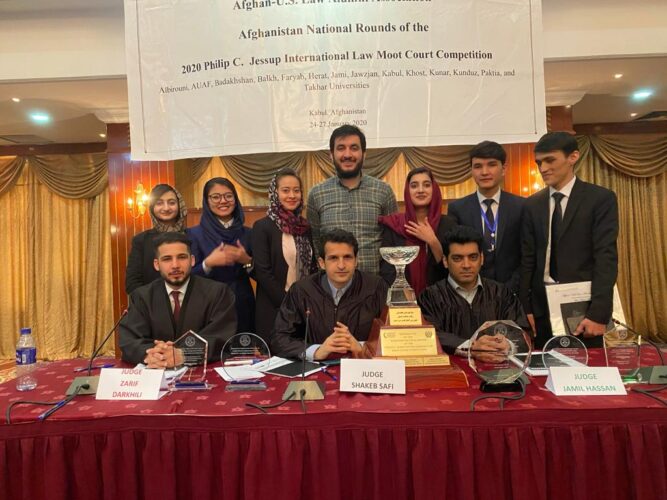Visiting SLS Fellow and AUAF Law Professor Reflects on Afghanistan Two Years After Taliban Takeover
Nasiruddin (Nasir) Nezaami’s heart was pounding as he neared the Torkham crossing at the Afghanistan-Pakistan border in May 2022. The Taliban had re-taken Afghanistan nine months earlier and he was exhausted and scared. He had been constantly on the move, switching houses every few weeks to stay under the Taliban’s radar while continuing to teach his law classes online at the American University of Afghanistan (AUAF).

Nezaami had more than one reason to try to get across the border that day: He was the chair of the law department at a U.S. government-supported university. He had worked on various U.S. Agency for International Development-funded projects. He had studied law in the United States and had collaborated with Stanford Law School’s Afghanistan Legal Education Project (ALEP). On top of it all, he was a native of the anti-Taliban province of Panjshir. Professors across the country were being detained, tortured, and killed for less.
He already had deleted or burned any photo or document that connected him to AUAF or ALEP, but he still took the risk of bringing with him a prized possession: his 2015 LLM diploma from the University of Washington School of Law. With help from a friend of a friend, good timing, and a convincing story, he made it across the border.
His ultimate destination: Stanford Law School, where he is now starting his second year as a visiting fellow. As soon as the Taliban swept back into power in 2021, SLS lecturer Erik Jensen, director of SLS’s Rule of Law Program, put the wheels in motion to get his friend and professional collaborator out of the country. Dean Jenny Martinez pledged financial support from the law school, which was supplemented with funds from the Institute of International Education’s Scholar Rescue Fund. The IIE has provided support, fellowships, and academic opportunities for persecuted scholars for more than 100 years.
“It is not an exaggeration to say that the funding and support of the SLS community could well have saved Nasir’s life,” Jensen says.
Helping Those Left Behind
“I had traveled to Pakistan a number of times in my life, and I had always viewed the Pakistani police with some fear, even though my family had lived in Pakistan for several years when the Taliban were in power the first time,” says Nezaami. “This time, when crossing into Pakistan, I felt the opposite of fear. It was freedom and elation.”
The months on the run had taken their toll, though.
“I picked up Nasir at SFO and he looked just terrible,” says Jensen. “Of course he was extremely happy to be out of Afghanistan, but most of his extended family is still there. That weighs heavily.”
Jensen launched ALEP in 2007, a student-driven project that played a key role in establishing the American University of Afghanistan’s law studies program through a U.S. State Department Grant in 2012. ALEP students also wrote and published numerous textbooks for Aghani law students, among other initiatives.
In 2019, Jensen, who then served on the board of AUAF, recruited Nezaami to chair AUAF’s law department. At the time, Nezaami was just shy of his 27th birthday and was teaching at his undergrad alma mater, Kabul University, wowing students with his American-style teaching, including the Socratic method, which he had learned during his LLM program.
“Nasir was always among the best and brightest,” Jensen says. “He graduated at the top of his LLM class and has this incredibly diverse set of interests in the law, from Islamic criminal law to technology law.”

As an SLS fellow, Nezaami has continued to teach full time at AUAF, which was founded in 2006 and now operates remotely through Dohar, Qatar. He teaches a broad range of courses, from international humanitarian law to professional responsibility to labor law. He also is engaged in research and scholarship in a variety of technology law areas, focusing primarily on data privacy and looking into best practices for Internet companies that gather and store customer data. His interest in technology law was ignited by a 2018 stint working on an Asia Foundation project that involved drafting commentary to the prior government’s penal code governing cyber crimes.
He often foregoes sleep in order to provide online support and assistance to one-time female law students back in Afghanistan—some of whom are his students—whose lives crumbled in December 2022 when the Taliban banned women from pursuing higher education. For the safety of the women and the integrity of the online assistance he is able to provide, Nezaami is hesitant to reveal too many details, but part of his work with these women involves helping them improve their English and navigating and applying for scholarships outside Afghanistan.
“These young women are suffering like you cannot imagine,” he says. “For those who had just graduated, or were close to graduating, it was just devastating, like ripping out a part of them.”

Women made up more than half of the law school student body when Nezaami chaired the AUAF law department. His female students were often the stars of the moot court competitions AUAF teams participated in–and often won–in Afghanistan and Europe.
He is organizing a September online conference, in partnership with Stanford’s Center for South Asia Studies, on the future of education for women and girls in Afghanistan, along with Halima Kazem-Stojanovic of the Hoover Institution’s Afghanistan Research and Relief team and Mustafa Babak, executive director of the Afghan-American Foundation.
Navigating Life in the United States
While he does what he can for those back in Afghanistan—and waits for his asylum application to be processed—Nezaami has embraced the California lifestyle. Almost to his own astonishment, he has even given up smoking. Jensen and others in the SLS community, as well as his host families, have pooled resources and efforts to assist Nezaami in navigating many aspects of his new life in the United States.
Though he is “overwhelmingly grateful” to be cycling around sunny Palo Alto and enjoying full academic freedom, he is not shy about discussing the toll of the last several years. He worries constantly about his siblings and extended family, most of whom continue to move from place to place in Afghanistan to avoid attention from the Taliban.
“I have so much to be thankful for” he says. “But still, it is hard. Part of me is still back in Afghanistan.”
Read a 2021 Legal Matters Q&A in Stanford Lawyer with Nezaami, Jensen and others about “Legal Education in Afghanistan and the Return of Taliban Rule.”
